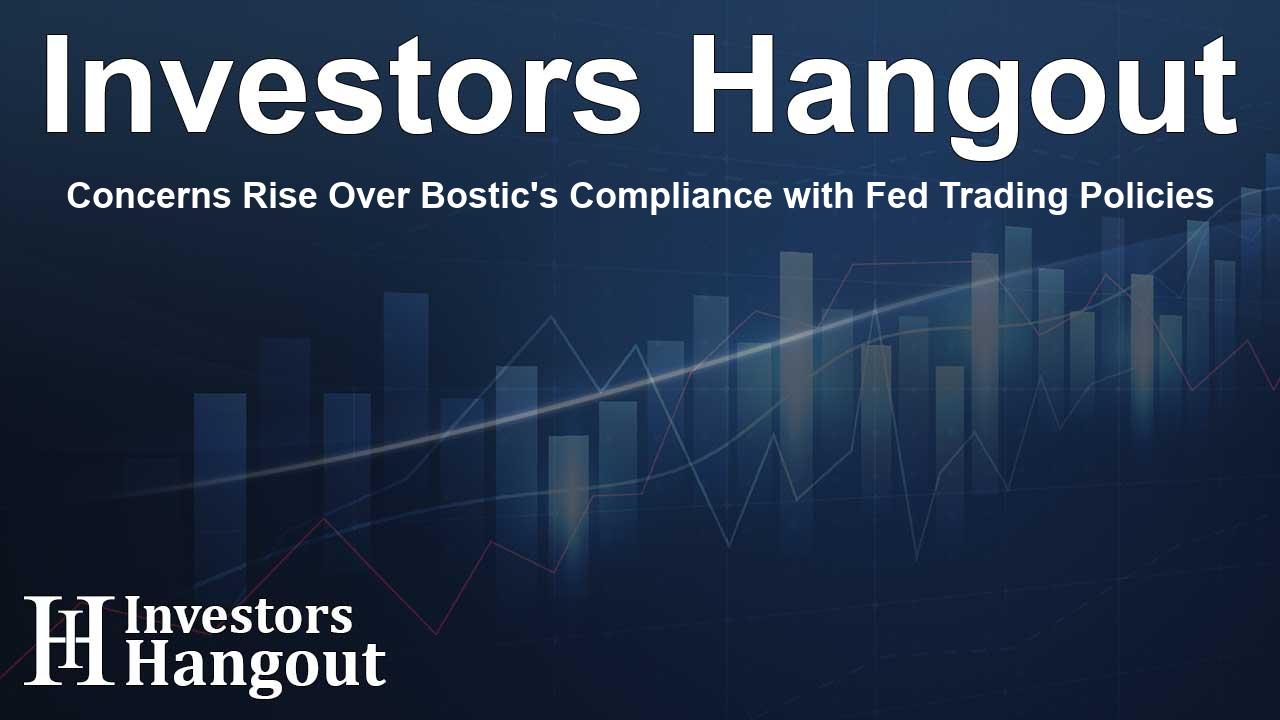Concerns Rise Over Bostic's Compliance with Fed Trading Policies

Atlanta Fed President Faces Scrutiny for Trading Violations
The recent findings involving Atlanta Federal Reserve President Raphael Bostic have raised eyebrows regarding adherence to trading policies set by the U.S. central bank. A report from the Fed's Office of Inspector General has indicated that Bostic's activities did not align with established guidelines, although it's crucial to note that he did not trade using confidential information.
Implications of the Report on Bostic's Actions
The report explicitly states that Bostic's actions fostered the possibility of appearing to act on private information related to the Federal Open Market Committee (FOMC) during its blackout period. This situation not only compromises the integrity of his position but also raises questions about the potential for conflicts of interest according to the Atlanta Fed's code of conduct.
Reactions from the Atlanta Fed Leadership
Following the revelations in the report, the Atlanta Fed board, which represents Bostic, conveyed its serious concern over the findings. They indicated that a comprehensive discussion among board members is imminent to address the details and implications of the report.
The Broader Context of Trading Issues at the Fed
This isn't the first time that issues surrounding trading ethics within the Federal Reserve have surfaced. The report on Bostic's financial practices follows previous investigations into several other policymakers, suggesting a pattern of concern regarding the trading activities of Fed officials. As recently as September 2021, public documents unveiled that the executives of the Dallas and Boston Federal Reserves engaged in active trading, prompting scrutiny over their decision-making processes.
Strengthening of the Fed's Rules Following Controversies
In response to growing controversies, including those surrounding former Dallas Fed President Robert Kaplan and Boston Fed President Eric Rosengren, the Federal Reserve implemented stricter rules governing investments by policymakers and senior staff. This overhaul of trading regulations took place in late 2021 and was solidified early the following year, reflecting the Fed's intent to restore public trust.
The Role of the Inspector General
The work of the Inspector General (IG) has come under fire by some Congressional members who are concerned about potential biases affecting the investigation outcomes, given that the IG is appointed by the Fed chair. However, the IG has publicly defended the independence of their office, affirming that they operate without interference from Fed leadership.
Looking Ahead: The Future of Policy and Transparency
The ramifications of Bostic's trading report extend beyond personal consequences; they highlight the ongoing battle for transparency within one of the nation’s most influential financial institutions. As the Fed continues to face scrutiny, particularly in the wake of the implications regarding monetary policymaking, one can expect calls for further reform and accountability among its ranks.
The central bank's approach to trading policies is under the microscope now more than ever, as the public and policymakers alike grapple with the overall integrity of the institution aimed at maintaining economic stability.
Frequently Asked Questions
What were the main findings of the report regarding Bostic?
The report indicated that Bostic violated trading policies of the Fed by creating an appearance of acting on confidential information and potential conflicts of interest.
How is the Atlanta Fed addressing the findings?
The Atlanta Fed's board has stated they take these issues seriously and plans to meet to discuss the report's details further.
What were the previous controversies involving Fed policymakers?
Prior controversies involved the trading activities of former Fed presidents, leading to a revision of the Fed's trading rules due to concerns about potential conflicts of interest.
How has the Fed changed its policies in response to these issues?
In late 2021, the Fed introduced stricter regulations on trading and investment activities among its policymakers, formalizing these changes in early 2022.
What is the role of the Inspector General in these investigations?
The Inspector General oversees the investigations into the Fed officials' compliance with trading rules and has defended the independence of their work against Congressional scrutiny.
About Investors Hangout
Investors Hangout is a leading online stock forum for financial discussion and learning, offering a wide range of free tools and resources. It draws in traders of all levels, who exchange market knowledge, investigate trading tactics, and keep an eye on industry developments in real time. Featuring financial articles, stock message boards, quotes, charts, company profiles, and live news updates. Through cooperative learning and a wealth of informational resources, it helps users from novices creating their first portfolios to experts honing their techniques. Join Investors Hangout today: https://investorshangout.com/
Disclaimer: The content of this article is solely for general informational purposes only; it does not represent legal, financial, or investment advice. Investors Hangout does not offer financial advice; the author is not a licensed financial advisor. Consult a qualified advisor before making any financial or investment decisions based on this article. The author's interpretation of publicly available data shapes the opinions presented here; as a result, they should not be taken as advice to purchase, sell, or hold any securities mentioned or any other investments. The author does not guarantee the accuracy, completeness, or timeliness of any material, providing it "as is." Information and market conditions may change; past performance is not indicative of future outcomes. If any of the material offered here is inaccurate, please contact us for corrections.